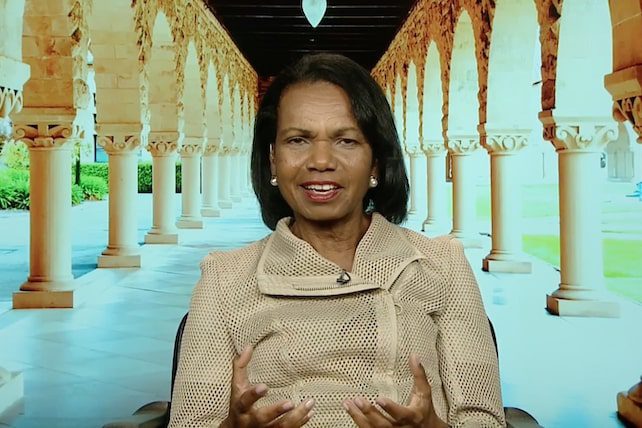Dr. Condoleezza Rice, former U.S. national security advisor and former secretary of state, has navigated racism, being a woman in male-dominated spaces, and leading the U.S. during the attacks on Sept. 11, 2001. Rice appeared at the Global Leadership Summit 2023 (GLS) Thursday, Aug. 3, where she shared key lessons she has learned from her experience as a leader.
“You have to own your past, but you also can’t be prisoner of your past,” Rice said, specifically addressing growing up as a woman of color in Birmingham, Alabama, which she has elsewhere referred to as “the most segregated city in America at the time.” Resilience has been a theme of Rice’s life, and it is an attribute for which she gives a great deal of credit to her parents.
RELATED: Condoleezza Rice: 9/11 Shows Us How to Respond to This Crisis with Faith
Condoleezza Rice’s Upbringing
Condoleezza Rice, whose father and grandfather were pastors, grew up in Birmingham, Alabama, in the 1960s. She referred to her parents several times throughout the interview, describing them as significant role models in her life. Her father, a theologian, “allowed me to be a questioner,” said Rice. From him, she learned that “it’s ok to ‘go there'” with one’s faith, that is, to wrestle with God during difficult times, such as when Rice lost her mom to breast cancer when her mother was only 61.
“God gave us a mind, and I think he expects us to use it,” Rice said, emphasizing that this use includes asking critical questions about our faith.
Rice’s parents were crucial to fostering a resilient mindset in the face of the racism their family and the rest of the Black community faced in Birmingham. Rice personally knew Denise McNair, one of the four girls killed in the 16th Street Baptist Church bombing that occurred on Sept. 15, 1963. In fact, everyone in Rice’s community knew at least one of the girls who were killed.
In a 2020 interview, Rice explained there was a lot of fear at the time. They could not trust the police because the police were just as likely as anyone else to set off bombs targeting Black people. White knight riders with the Ku Klux Klan would come through their community, so Rice’s father and his friends ended up forming a militia of sorts to protect people from the KKK. “All we could do in those days was to pray,” said Rice, “and I have to say, it was sufficient.”
Rice told the GLS attendees that her parents raised her never to see herself with a victim mentality. They were “fantastic” at not allowing her to see anything but “upward mobility, the ability to get things done.” While they told Rice she would have to work twice as hard as others for her achievements, they never presented that reality as something shameful. So she and others did work twice as hard, and “now we’re twice as confident.”
“You own your past, it has shaped you,” she said, “but never become a prisoner of it.”
Leading During 9/11
Rice was National Security Adviser on Sept. 11, 2001. She said that she still feels “deep remorse” about the lives lost because of those attacks, although “I can tell you we did everything we knew how to do” with the imperfect intelligence they had.

